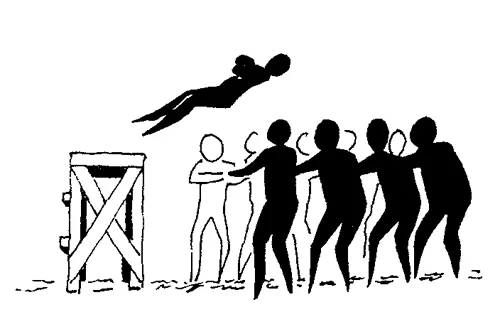The trust-fall — it’s the quintessential team-building go-to game. I love feeling exhilarated and terrified all at once! The key to its success is obvious; you must trust that people will actually deliver on their promise to catch you. It’s not enough just to hear, “We’ve got your back; we won’t let you fall.” Action transforms a promise into proven trustworthiness.
Trust in school leadership is important to productivity, innovation, loyalty, positive morale, and more. There is no shortage of research and opinion pieces citing the ways leaders can earn trust. Clarity, consistency, contribution, compassion, and other traits that don’t begin with a C are essential for building leadership trust.
A slightly interesting twist in the trust game surfaces in an article about trust in leadership in the Harvard Business Review by Holly Henderson Brower, et al. “Trust begets trust,” the article’s authors noted. To build trust FROM others, leaders need to show trust IN others.
Themes of trust surface early on in the Tanakh. When reading the story of Noah, the text points to the importance of leaders establishing trust through tangible actions — not just words. When God extended the covenant to Noah after the great flood, we read “And I, behold I am setting up My covenant with you and with your seed after you” (Genesis 9:9). The medieval commentator Rashi noted “And I, behold I” indicates that God understood Noah’s need for a symbol to indicate a genuine commitment to the covenant. A few verses later God delivered and explicitly pointed out the rainbow as evidence. “This is the sign of the covenant that I have set up, between Myself and between all flesh that is on the earth” (Genesis 9:17). To build trust God provided an observable, public sign to verify the verbal commitment.
Coupling contemporary research on leadership with this “trust text,” I challenge you to ask yourself more than just whether you trust your team. Instead, ask yourself what you are actually doing to demonstrate trust in them. Here are a few suggestions for rainbow making — putting actions behind your words:
Delegate and deputize — Go beyond the distribution of tasks. Offer team members an opportunity to create or take on leadership roles for projects outside their portfolios.
Support mistakes — Don’t point blame at staff members when something goes awry. Encourage reflection and reinforce the value of learning by doing to shape and inform growth.
Invest in team members’ professional development — Nothing shows you believe in someone more than investing in them. Providing any form of professional development or training (even giving them time with a mentor) is the organizational way of saying, “my money’s on you”! This tactic has particular value if a project requires expert content knowledge or specific skill-building.
Encourage informed, thoughtful risk-taking — It’s more than putting them in the driver’s seat; it’s giving them a chance to plan the trip. Let teachers and staff members have a hand in developing or implementing innovations that they envision. Be sure you are a travel partner on this learning journey.
Listen without judgement — Prove the trust you have in your teachers and staff by giving them the professional courtesy to disclose frustrations, concerns, or worries without risk of you interfering or taking away related responsibilities. Everyone needs to blow off steam, and your openness to their feelings indicates you trust in their ability to stay the course — even in rough waters (Yes, that’s a shout out to Noah!)
Provide feedback respectfully and with specificity — Show that you trust your team members to take feedback in the spirit you offer it. Use kind, clear language and be direct about what did or didn’t work and why. Show your trust by thanking them ahead of time for using feedback to inform their decision-making moving forward.
Jewish Day Schools continue to explore at a rapid pace much needed change and innovation. Trust in leadership is more critical than ever. Taking the plunge into unchartered waters requires tremendous faith and belief in a leader championing forward motion. Are you prioritizing trust building as part of your leadership approach, and if you are, what is your rainbow?
Rebecca Weisman, senior communications officer at the Mayberg Foundation, brings over two decades of experience as a Jewish communal leader. Over her career, she has developed expertise in communications, leadership and management from her roles as a Jewish day school principal, congregational principal, Jewish communal innovator, foundation professional and nonprofit executive director.
This article was adapted from content on The Times of Israel Blog.


